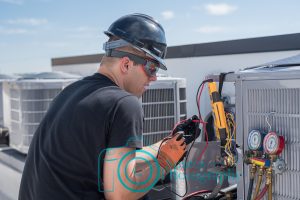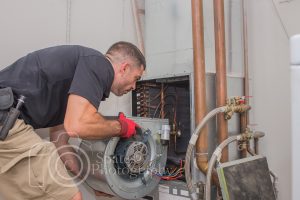There are various types of HVAC Training, some of these may include
- HVAC Trade Schools
- HVAC Apprenticeship Training Programs
- EPA 608 Certification Core (Mandatory) Universal, Type 1, Type 2, Type 3
- NATE Certification
How do I get into the HVAC trade?
The best way to get your HVAC career started is to have hands-on experience, your EPA 608 certification, and great customer service. I highly recommend going to a trade school if possible, as they will offer technical details, hands on training and job safety procedures. Although HVAC trade school certifications and degrees are not mandatory to jump start your career, EPA Section 608 is.
HVAC Training at a Trade School
 A good start to pursuing a career in the HVAC industry would be to enroll at a HVAC Trade School. The length of these programs can vary from 6 months to 2 years.
A good start to pursuing a career in the HVAC industry would be to enroll at a HVAC Trade School. The length of these programs can vary from 6 months to 2 years.
The cost for these programs can fluctuate depending on many factors, such as length of program, school, location, degrees offered and quality of instructors and training facilities. Some of these may be up to $30,000 for tuition. Certain schools may include the purchase of hvac tools needed to complete minor repairs, maintenance’s and inspections.
Find HVAC Trade Schools around Me
HVAC Training through Apprenticeship Programs
 Hvac apprenticeship training is a VERY broad term. Some companies that offer these ‘programs’, or job openings, will often ask for prior experience in the HVAC field. Some Hvac trade schools may have apprentice programs available to you upon graduation though. Either way, Hvac Apprenticeship is when you work under a senior HVAC technician for a set time. This could be 6 months to 2 years.
Hvac apprenticeship training is a VERY broad term. Some companies that offer these ‘programs’, or job openings, will often ask for prior experience in the HVAC field. Some Hvac trade schools may have apprentice programs available to you upon graduation though. Either way, Hvac Apprenticeship is when you work under a senior HVAC technician for a set time. This could be 6 months to 2 years.
HVAC Certifications
EPA Section 608
The EPA certification, at least the Core and Type 1 and 2, is a absolute must-have if you are going to be working with refrigerant. It’s also the law, and fines could incur if you are handling refrigerant without being EPA Section 608 certified.
If you are going to be handling refrigerant this certification is absolutely necessary. Should you be pursuing a career in the HVAC field that may require IT work, schematics, sheet metal, sales, dispatching, then you should still get this certification anyway.
A good HVAC trade school should have the EPA Section 608 certification in their curriculum. If you are not going to a trade school, then here’s more information about where to get EPA certification, and the types of EPA certification.
Nate Certification
NATE, or North American Technical Excellence, offers various certificates, and specialty certifications for those who have already have HVAC experience. You can be assured that if you see a technician with the NATE patch on their uniform, they have experience and knowledge and meet industry standards in that specialty. The more certifications you have, may or may not increase your odds to land a HVAC job, but it won’t hurt. If I was looking at two resumes with almost identical qualifications, but if one had a few NATE certifications, then I’m going with NATE. I would recommend pursuing NATE certification once you have had a few years of hands on experience. Although some trade schools may offer this as part of their curriculum. Learn more about NATE certification.
HVAC Jobs and Pay
There are several types of HVAC jobs that you could apply for upon completing your training and certification. Some of these may include installers, service technicians and system engineers.
Who hires HVAC Certified Technicians?
- HVAC/R Contractors
- HVAC/R Service Companies
- Hotel Maintenance
- Apartment Communities
- Certain Government Facilities
- Warehouses Specializing in Sheet Metal Fabrication
The average pay for HVAC technicians as of August 2019 is $48,985 annually according to ZipRecruiter.
Do you just want to learn more about HVAC?
Then head on over to the blog. There are various articles covering a wide range of topics. Topics that apply to homeowners, business owners, beginning HVAC technicians, and those that have a desire to work in the HVAC field.